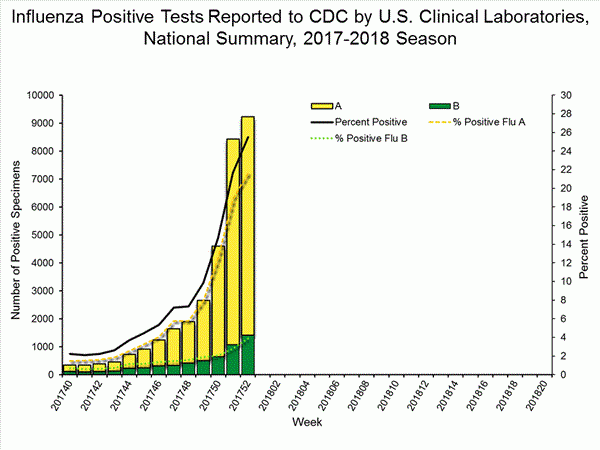US Flu Outbreak: Repeated Influenza Vaccinations Could Reduce Spread, Study Finds
A new study has found that repeated administration of influenza vaccination in older adults dramatically will reduce the severity of flu cases, viral infections and number of hospital visits.
A team of researchers from Spain studied the effect of repeated influenza vaccinations in people aged 65 years and older admitted to 20 Spanish hospitals in 2013/14 and 2014/15 to determine whether repeat vaccination could reduce severe influenza. They also tried to analyze the effectiveness of the vaccine amidst a growing distrust among people when it comes to vaccines and preventive care in general.
The team studied the patients from 3 seasons when influenza activity was high and subjected them to a more than usual number of flu shots to check how effective cranking up the dosage was. They found that the repeated exposure to influenza vaccination helped the body’s immune system much better and there were remarked improvements in the general ability of the immune system to fight away infection.
The team found that increasing the number of shots was twice as effective in preventing severe influenza in people admitted to hospital for the virus. They also found that this transcended seasons and age groups. When the number of vaccination shots were increased, patients showed marked improvement in their ability to fight off influenza and related symptoms across all ages and seasons.
"Repeated vaccination for influenza was highly effective in preventing severe and fatal infection caused by influenza in older adults," said Dr. Itziar Casado and Dr. Jesús Castilla, Instituto de Salud Pública de Navarra, Pamplona, Spain in a press release.
The team found that this way of countering the disease was very effective in the battle against the more severe cases.
"Because severe cases of influenza may be prevented by 2 mechanisms, the effectiveness of vaccination against severe influenza may be greater than that for mild cases, and the benefit of influenza vaccination may be greater than that estimated in previous studies."
"The prevention of severe and fatal infection caused by influenza was observed mainly in patients who were vaccinated in both the current and previous seasons, which reinforces the recommendation of annual vaccination for influenza in older adults," the authors added.
This study came at a very crucial time. The U.S. witnessed a mass Influenza A breakout and the current flu season was categorized as being “moderately severe.”
The Centers of Disease Control and Prevention’s (CDC) FluView released a statement in the last week of December which said, “During week 52 (December 24-30, 2017), influenza activity increased sharply in the United States.” In fact, its statistics showed there was a huge surge in the number of Influenza A (H3N2) cases in 46 states across the U.S. and it was compared to the “moderately severe” outbreak in 2014.

Compared to H1N1, the other seasonal Type A strain, and B strains that hit their peak in the winter, this strain — the H3N2 — tends to be much more lethal and kills young children and very old adults who either have a developing or a failing immune system.
Several states have reported mass outbreaks. Washington has seen 16 outbreaks in long-term care facilities and hospitals, with an increase in the number people showing up at hospitals with flu-like symptoms. In Pierce County alone, 45 people — from children below 5 to nonagenarians, were hospitalized with influenza-related illnesses. Four people in the county also died, all of them at least 64 years old, according to the Tacoma-Pierce County Health Department.
Reports from Jan. 7 said California was hit pretty hard too. Older reports talked about pharmacies in the state running out of flu medicine, packed emergency rooms at hospitals and a rising death toll.
Health officials across the country were stressing on the importance of the vaccine, even for patients displaying moderate to severe symptoms. It can bring down the fever and also help patients get well faster, possibly even keeping them out of the hospital. Three other strains of flu are also covered by the vaccine.
Health officials also stress that getting the vaccine can keep people from spreading the flu to those at higher risk, including the very young and very old. The flu season of 2016-17 was the worst in nearly a decade, with 278 deaths compared to the 157 deaths in 2015-16.
The study on the effectiveness of repeated vaccination on older adults was published in CMAJ (Canadian Medical Association Journal).
© Copyright IBTimes 2025. All rights reserved.





















